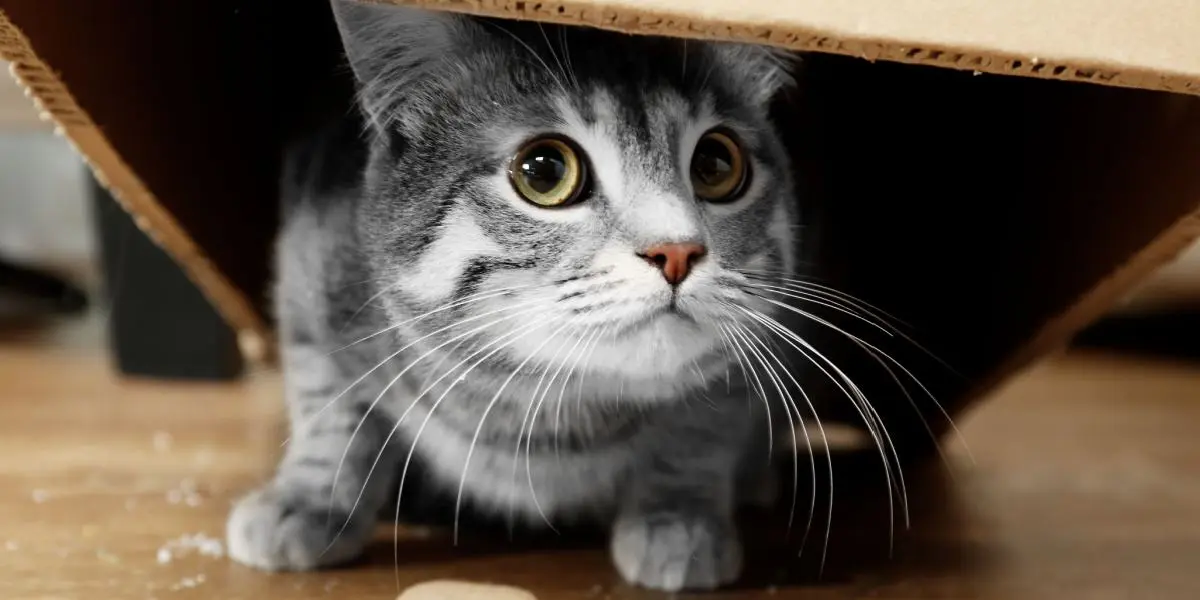When your normally social cat suddenly disappears under the bed or into closets for hours or days, it can be concerning. Understanding why is my cat suddenly hiding is essential for addressing potential health issues or environmental stressors. This comprehensive guide examines the various reasons behind this behavior change and offers expert solutions to help your feline friend feel secure again.
As a feline behavior specialist with over 15 years of experience working with cats of all temperaments, I’ve encountered countless cases of sudden hiding behavior. From my professional experience, sudden hiding is rarely random—it’s almost always a response to something in your cat’s internal or external world that has changed. The key to addressing why is my cat suddenly hiding lies in careful observation and understanding of feline psychology.
In this in-depth guide, I’ll walk you through the most common reasons cats suddenly start hiding, how to differentiate between normal and concerning hiding patterns, and provide proven strategies to help your cat feel comfortable again. Whether your cat has been hiding for hours or days, you’ll find the insights you need to address this puzzling behavior change.
Common Reasons Cats Hide
To understand why is my cat suddenly hiding, we need to examine the most frequent triggers for this behavior. Cats are creatures of habit who prefer predictability, so sudden changes often prompt hiding as a coping mechanism.
Fear and Anxiety
Fear is one of the most common reasons why is my cat suddenly hiding, with several potential triggers:
- Loud noises: Construction, thunderstorms, fireworks, or even a dropped pan can send cats into hiding
- New people: Visitors, maintenance workers, or new household members may be perceived as threats
- Other animals: The sight, sound, or scent of another animal (even through a window) can trigger hiding
- Sudden movements: Quick or unexpected movements may activate your cat’s prey instinct to hide
I once worked with a cat named Luna who suddenly began hiding under the bed for hours each day. After careful observation, we discovered the neighbor had started using a new lawn mower exactly when Luna’s hiding behavior began. The unfamiliar noise was triggering her fear response.
Environmental Changes
Cats are highly sensitive to changes in their environment, which explains why is my cat suddenly hiding after:
- Moving homes: Relocation is extremely stressful for territorial animals like cats
- Furniture rearrangement: Even minor changes to their territory can be disorienting
- New pets or people: Additions to the household disrupt established dynamics
- Remodeling or construction: Changes to familiar spaces create uncertainty
- New scents: New cleaning products, air fresheners, or even laundry detergents
A Bengal cat I worked with began hiding inside kitchen cabinets after his family replaced their living room furniture. What seemed like a minor change to the humans was a significant territorial disruption from the cat’s perspective. Creating a “safe zone” with his familiar items helped him adjust gradually.
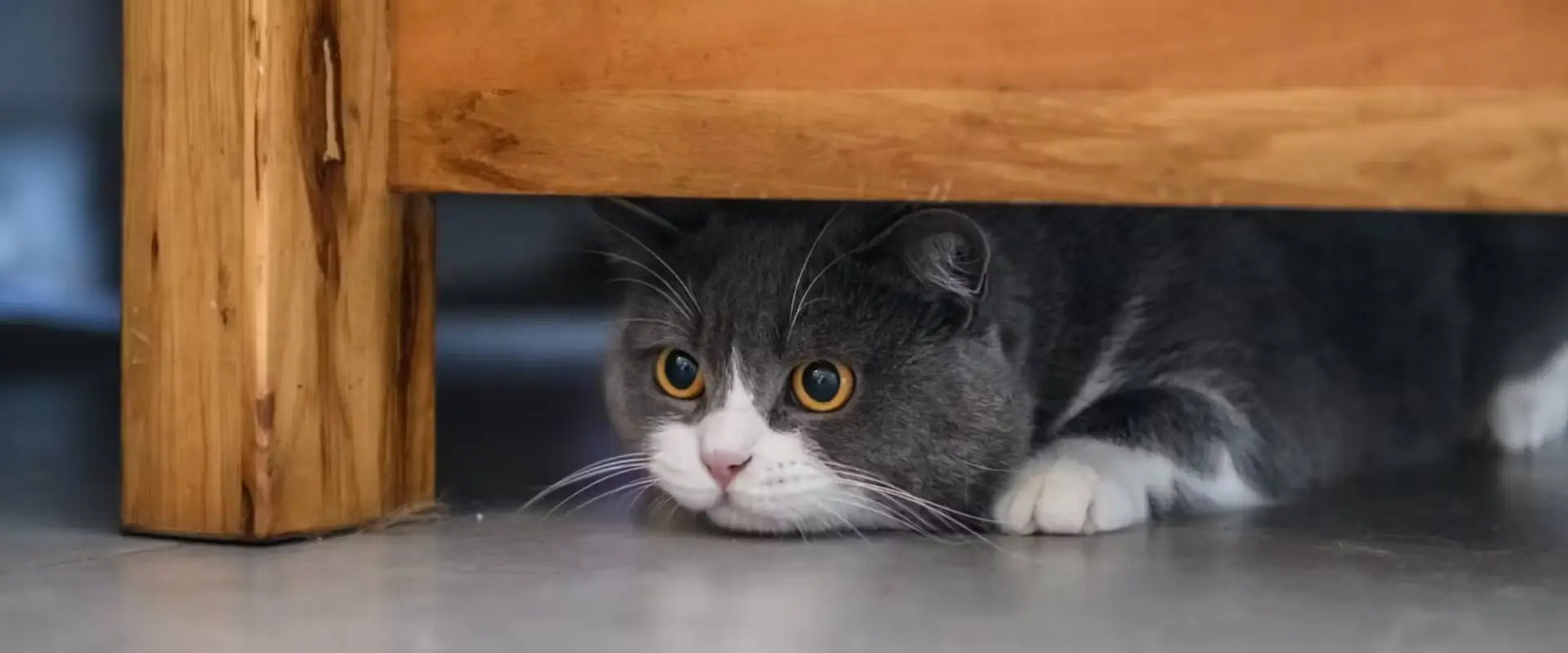
illness or Injury
One of the most critical reasons why is my cat suddenly hiding relates to physical health:
- Pain: Cats instinctively hide when in pain to avoid showing vulnerability
- illness: Many diseases cause cats to seek isolation
- Internal injuries: Even minor injuries may trigger hiding behavior
- Digestive issues: Stomach pain or nausea often leads to withdrawal
- Neurological problems: Disorientation or confusion can cause hiding
This natural instinct served wild cats well—hiding when sick protected them from predators when vulnerable. Your domestic cat retains this evolutionary programming, which is why monitoring hiding behavior is crucial for early detection of health issues.
Trauma or Past Experiences
Previous negative experiences can suddenly trigger hiding behavior:
- Adverse events: A cat who was once scared by a vacuum might hide whenever they hear similar sounds
- Negative associations: If your cat associates certain people or objects with unpleasant experiences
- Shelter/rescue trauma: Previously abandoned or mistreated cats may have hiding triggers related to past trauma
A rescued tabby I consulted on would hide whenever anyone carried a specific type of bag, similar to the one used when he was surrendered to the shelter. Understanding this trigger allowed his new family to avoid using similar bags in his presence.
Age-Related Changes
Senior cats often exhibit different hiding patterns:
- Cognitive decline: Confusion or disorientation can lead to hiding
- Reduced sensory capacity: Diminished vision or hearing may increase vulnerability
- Increased sensitivity to environmental changes: Older cats often take longer to adapt to changes
- Physical discomfort: Age-related conditions like arthritis may prompt hiding to rest
For more information on how aging affects cat behavior, visit our senior pets health guide for comprehensive insights.
Changes in Environment and Their Effects on Cat Behavior
Environmental changes significantly influence why is my cat suddenly hiding, as cats are highly territorial animals who rely on familiarity for security.
Home Renovations and Remodeling
Construction or renovation projects can dramatically affect cats:
- Noise disruption: Unfamiliar loud sounds are extremely stressful
- Dust and odors: New materials release unfamiliar scents
- Stranger presence: Workers in the home represent territorial intrusion
- Physical changes: Altered spaces can cause disorientation
During a kitchen renovation, a client’s previously social Siamese began hiding in the furthest bedroom closet during the day. We created a “construction-free zone” with sound dampening features and familiar items, which significantly reduced his stress.
New Additions to the Household
The introduction of new people or pets frequently explains why is my cat suddenly hiding:
- New pets: Other animals represent competition for resources and territory
- New family members: Babies, roommates, or partners change household dynamics
- Visitors: Even temporary guests can disrupt your cat’s sense of security
- Changed routines: New people often bring schedule changes that affect cats
Altered Household Dynamics
Even subtle changes in how the household functions can trigger hiding:
- Schedule changes: Work schedule adjustments, travel, or school changes
- Relationship tensions: Cats are sensitive to household conflict
- Altered attention patterns: Less or different types of interaction
One family couldn’t understand why their cat started hiding after their teenager left for college. The missing family member had been the cat’s primary companion, and the disruption to their bond triggered anxiety-related hiding behavior.
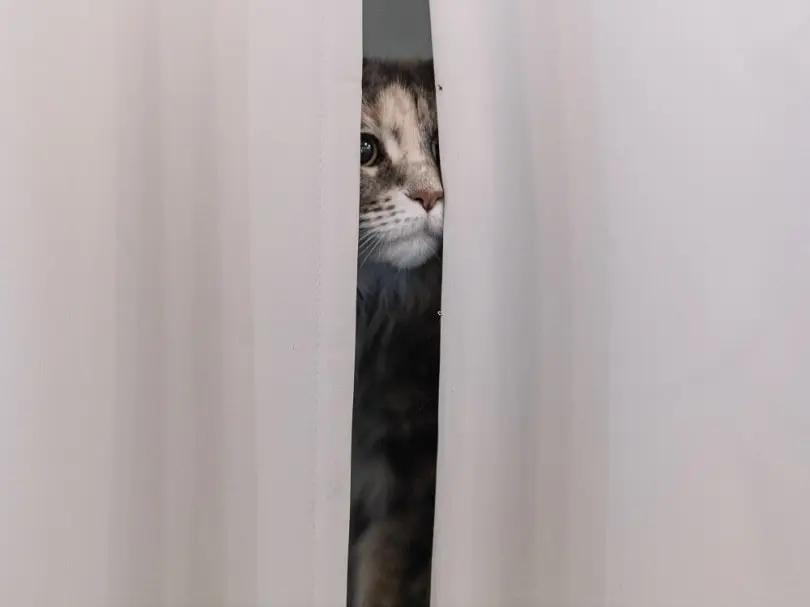
Moving to a New Home
Relocation is one of the most profound environmental changes explaining why is my cat suddenly hiding:
- Complete territorial disruption: No familiar scents or landmarks
- New sounds and smells: Unfamiliar sensory information
- Changed spatial arrangements: Different hiding spots and pathways
- Neighborhood changes: New outdoor sights, sounds, and animal presences
Signs of Stress in Cats and Their Connection to Hiding
Stress is a primary factor in why is my cat suddenly hiding. Recognizing other stress indicators can help confirm if hiding is stress-related and identify the source.
Physical Signs of Feline Stress
Look for these physical indicators that often accompany stress-related hiding:
- Changes in grooming: Either excessive grooming (leading to bald spots) or lack of grooming
- Altered eating habits: Decreased appetite or changes in eating patterns
- Digestive issues: Diarrhea, constipation, or vomiting
- Inappropriate elimination: Urinating or defecating outside the litter box
- Body posture changes: Tucked tail, flattened ears, crouched position
Behavioral Indicators
Behavioral changes often accompany hiding when stress is the cause:
- Increased vocalization: Excessive meowing, yowling, or unusual sounds
- Aggression: Unexpected hissing, swatting, or biting
- Changes in play behavior: Disinterest in previously enjoyed toys or activities
- Altered sleep patterns: Sleeping more or at unusual times
- Excessive startle response: Jumping at minor sounds or movements
I worked with a household where the cat began hiding under the bed for hours each day. Additional stress behaviors included excessive grooming and refusing treats. The cause turned out to be a new neighbor’s dog whose barking was audible through an adjacent wall, creating ongoing stress.
Subtle Signs Often Missed
Some stress indicators are easily overlooked when investigating why is my cat suddenly hiding:
- Dilated pupils: When not explained by lighting conditions
- Whisker position: Forward-pointing whiskers can indicate anxiety
- Tail twitching: Rapid twitching versus normal swaying
- Elevated breathing rate: Faster breathing when at rest
- Facial tension: Tightened muscles around eyes and mouth
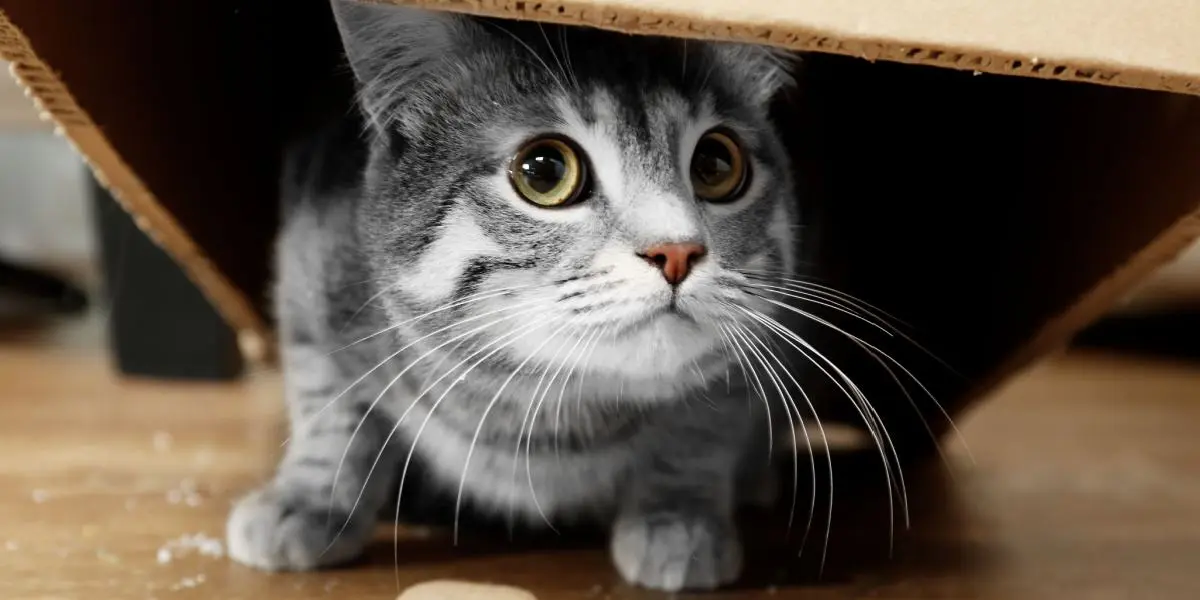
illness and Injury: Why Your Cat May Seek Solitude
One of the most concerning answers to why is my cat suddenly hiding relates to health problems. Cats instinctively conceal weakness, making hiding an important indicator of potential medical issues.
Common Health Conditions That Cause Hiding
Several medical issues frequently explain why is my cat suddenly hiding:
- Pain: Dental issues, arthritis, soft tissue injuries
- Gastrointestinal problems: Constipation, inflammatory bowel disease, parasites
- Urinary tract issues: Infections, blockages, or inflammation
- Respiratory conditions: Upper respiratory infections, asthma
- Neurological problems: Vestibular disease, seizure disorders
A Persian cat I consulted on had begun hiding behind the washing machine—an unusual spot he’d never used before. After a veterinary examination, we discovered he had developed a painful dental condition. Once treated, his hiding behavior resolved completely.
Post-Procedure Hiding
Hiding is common after veterinary visits or procedures:
- Surgical recovery: Post-operative pain and disorientation
- Medication effects: Side effects or unpleasant associations
- Sensory changes: Unfamiliar hospital smells on their fur
- Lingering effects of anesthesia: Disorientation or nausea
Injury-Related Hiding
Even minor injuries can trigger significant hiding behavior:
- Paw injuries: Cuts, splinters, or broken claws
- Falls or impacts: Internal bruising not visible externally
- Fight wounds: Especially abscesses, which may not be immediately visible
- Foreign bodies: Items stuck in paws or fur causing discomfort
A seemingly healthy young tabby suddenly started hiding under furniture, emerging only for brief periods. A thorough examination revealed a small thorn embedded in his paw pad—virtually invisible but causing significant pain.
Assessing Your Cat’s Health When Hiding Becomes Frequent
When trying to determine why is my cat suddenly hiding, a systematic assessment of their health can help identify potential medical causes.
At-Home Health Assessment
Before assuming behavioral causes, perform these checks:
- Visual examination: Look for wounds, swelling, limping, or changes in gait
- Gentle body check: Feel for tender areas, lumps, or heat (indicating inflammation)
- Hydration check: Gently pinch scruff—quick return to normal indicates good hydration
- Food and water intake: Monitor consumption patterns
- Litter box habits: Check for changes in elimination frequency, volume, or appearance
Warning Signs That Require Immediate Veterinary Care
Certain symptoms alongside hiding warrant urgent medical attention:
- Difficulty breathing: Rapid, shallow breathing or open-mouth breathing
- Inability to urinate: Especially in male cats (potential emergency)
- Significant lethargy: Unable to be roused or extremely weak
- Neurological symptoms: Stumbling, head tilt, seizures
- Evidence of trauma: Visible wounds, bleeding, or inability to use a limb
I once advised a family whose cat began hiding in their basement crawlspace—when they managed to check on him, they noticed labored breathing. This combination of hiding plus respiratory distress indicated pneumonia requiring immediate treatment.
Distinguishing Pain-Related Hiding
Pain-related hiding often has these characteristics:
- Consistent hiding location: Often choosing cool, dark, quiet places
- Minimal movement: Reluctance to change positions or locations
- Postural changes: Hunched back, tucked abdomen, or unusual positions
- Altered grooming: Either excessive focus on a painful area or neglect of grooming
- Facial expression changes: Squinted eyes, tense facial muscles
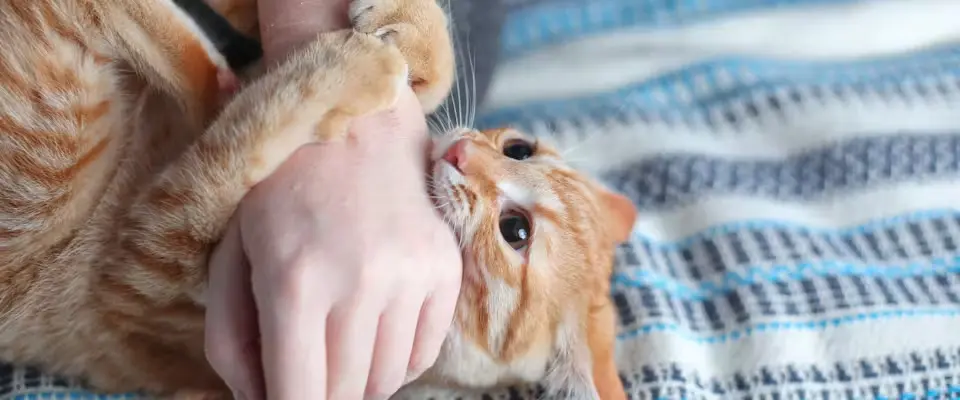
Comparisons: Hiding vs. Normal Cat Behavior
To accurately assess why is my cat suddenly hiding, it’s important to distinguish between normal feline privacy-seeking and concerning hiding behavior.
Normal Cat Solitude vs. Problematic Hiding
| Normal Solitude-Seeking | Concerning Hiding |
|---|---|
| Predictable patterns | Sudden change in behavior |
| Emerges regularly for routine activities | Misses meals or normal routines |
| Uses established favorite spots | Hides in new, unusual locations |
| Appears relaxed when approached | Shows tension or fear when discovered |
| Maintains social behavior | Avoids social interaction entirely |
| Engages with environment when out | Appears disinterested in surroundings |
Context Matters
Normal hiding occurs in specific contexts:
- After play or stimulation: Rest and recovery
- During high-traffic periods: Brief retreats during household activity
- Predictable daily patterns: Regular nap locations or privacy periods
- Weather-related: Many cats seek solitude during storms or extreme weather
Problematic hiding relating to why is my cat suddenly hiding typically involves:
- Extending beyond normal duration: Hiding for much longer than usual
- Occurring at unusual times: Missing normally social periods
- Accompanied by other behavioral changes: Aggression, elimination issues, etc.
- Resistance to enticement: Not responding to reliable attention-getters
A Maine Coon I evaluated had always enjoyed afternoon naps in a secluded cat tree compartment—this was normal solitude-seeking. When he began hiding under the bathtub during these same hours and avoided coming out even for meals, this represented a concerning behavioral change warranting investigation.
Personality and Breed Considerations
Individual differences influence hiding patterns:
- Naturally shy cats: Have lower thresholds for retreat
- Specific breeds: Abyssinians and Bengals tend to be more outgoing, while Persian and Himalayan cats are often more reserved
- Background: Former feral or shelter cats may have different hiding baselines
- Social development: Early socialization affects hiding tendencies
Behavioral Changes in Cats: When to Be Concerned
Understanding the broader context of behavioral changes helps identify why is my cat suddenly hiding and whether it represents a significant concern.
Red Flags When Assessing Hiding Behavior
These warning signs indicate hiding may be related to serious issues:
- Duration: Hiding lasting more than 24-48 hours
- Complete social withdrawal: Avoiding all human contact
- Physical changes: Weight loss, poor coat condition, lethargy
- Elimination issues: Not using the litter box or straining to eliminate
- Changed vocalizations: Unusual sounds, excessive meowing, or complete silence
After a house fire in a neighboring apartment, a client’s cat remained hidden for three days, missing meals and not using the litter box. This extended hiding combined with these additional signs indicated severe stress requiring professional intervention.
Normal vs. Abnormal Behavioral Changes
Some behavioral shifts are expected during life transitions:
- Temporary withdrawal during household changes: New babies, moving, renovations
- Brief hiding after veterinary visits: Response to stress and unfamiliar scents
- Seasonal changes: Some cats become more reclusive during specific seasons
- Age-related changes: Gradual increases in rest time and solitude as cats age
Concerning patterns that help explain why is my cat suddenly hiding include:
- Sudden personality shifts: A friendly cat becoming fearful or aggressive
- Progressive worsening: Hiding behavior that intensifies over time
- Clustering of changes: Multiple behavioral changes occurring simultaneously
- Context-inappropriate responses: Extreme reactions to minor stimuli
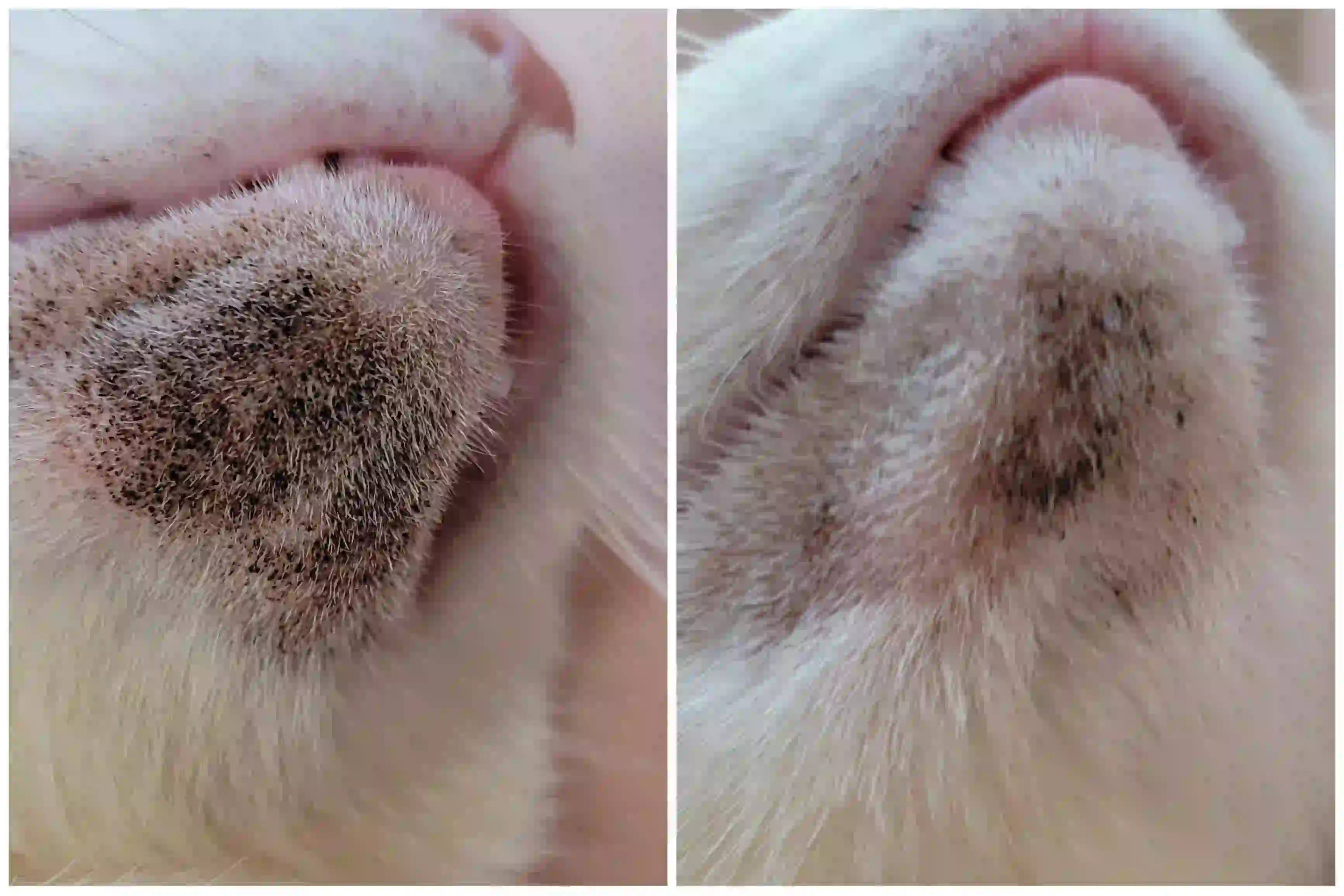
Strategies to Encourage Your Cat to Come Out
After identifying why is my cat suddenly hiding, targeted strategies can help coax them back to normal behavior.
Creating Safe Spaces
Establish security for cats recovering from stress:
- Elevated spaces: Cat trees or shelves providing vertical territory
- Multiple hiding options: Cat caves, covered beds, or partially enclosed spaces
- Strategic placement: Position safe spaces away from high-traffic areas
- Familiar scents: Use bedding with your cat’s scent or pheromone products
I helped a family whose cat had been hiding in their basement after a home renovation by creating a “halfway house” recovery zone. This quiet room with multiple hiding options, vertical spaces, and familiar items allowed their cat to gradually rebuild confidence before reintegrating into the full home.
Positive Reinforcement Techniques
Gentle encouragement works better than forced extraction:
- Food motivation: Place high-value treats progressively closer to open areas
- Play therapy: Use interactive toys that trigger prey drive
- Clicker training: Reward small steps toward normal behavior
- Voice and tone: Use soft, reassuring tones rather than loud coaxing
A particularly skittish Siamese responded well to clicker training after hiding due to construction noise. By marking and rewarding small movements toward open spaces, we gradually rebuilt his confidence.
Reducing Environmental Stressors
Address the causes behind why is my cat suddenly hiding:
- Noise management: Use white noise machines to mask disturbing sounds
- Scheduling around stressors: If possible, adjust your cat’s routine around predictable stress triggers
- Visual barriers: Window coverings to block views of outdoor stressors
- Scent management: Clean areas marked by other animals, use synthetic pheromones
Rebuilding Confidence Through Routine
Consistency is powerful in resolving why is my cat suddenly hiding:
- Regular feeding times: Creates predictability and security
- Interactive play sessions: Scheduled at the same times daily
- Quiet social time: Sitting near hiding spots without forcing interaction
- Gradual exposure: Slowly reintroduce normal household activities
For more comprehensive behavior modification techniques, visit our cat training guide.
Importance of Routine in Preventing Hiding Behavior
Establishing strong routines can prevent recurrence of hiding behavior by creating environmental predictability that cats crave.
Daily Structure
A consistent schedule helps reduce anxiety:
- Regular feeding times: Ideally 2-3 meals at the same times daily
- Play sessions: Scheduled energy outlets reduce stress
- Quiet periods: Designated low-stimulation times
- Social interaction: Consistent attention periods
After determining why is my cat suddenly hiding during a family’s schedule change, I helped them create a feeding and play schedule that maintained consistency despite their varying work hours. Their cat’s hiding behavior improved within two weeks.
Environmental Consistency
Physical environment predictability matters:
- Furniture placement: Minimize rearranging
- Litter box locations: Keep consistent and accessible
- Resource distribution: Food, water, and resting areas in consistent locations
- Territory respect: Recognize and preserve important cat spaces
Gradual Transitions
When changes are necessary:
- Slow introductions: New people, pets, or objects
- Planned disruptions: Prepare for known stressors like holidays
- Safe spaces: Maintain retreat options during transitions
- Familiar items: Keep consistent comfort objects available
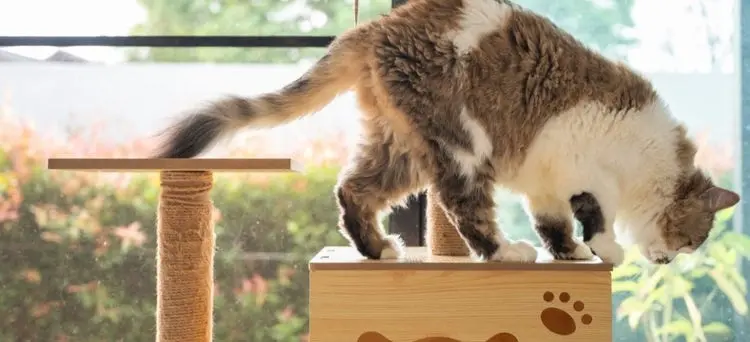
Enrichment Planning
Regular stimulation prevents boredom-related stress:
- Rotating toys: New objects on a schedule
- Feeding enrichment: Puzzle feeders and foraging opportunities
- Sensory stimulation: Bird videos, cat-safe plants, window perches
- Interactive play: Species-appropriate play mimicking hunting
When to Consult a Veterinarian About Hiding in Cats
Professional guidance is sometimes necessary to address why is my cat suddenly hiding, particularly when certain conditions are present.
Timeframes for Seeking Help
Use these guidelines for when to consult professionals:
- Duration-based: Hiding lasting more than 48 hours
- Behavior-based: Any hiding accompanied by concerning symptoms
- Pattern-based: Recurring episodes of hiding
- Context-based: Hiding disproportionate to environmental changes
What to Expect at the Veterinary Visit
Prepare for a comprehensive assessment:
- History taking: Detailed timeline of behavior changes
- Physical examination: Complete health assessment
- Potential diagnostics: Blood work, urinalysis, imaging if indicated
- Behavioral assessment: Evaluation of potential psychological factors
When I referred a client whose cat had been hiding for three days accompanied by reduced appetite, their veterinarian discovered early kidney disease—explaining why is my cat suddenly hiding and allowing for early intervention.
Potential Treatments
Professional solutions may include:
- Medical interventions: Treating underlying health conditions
- Pain management: For arthritis or other painful conditions
- Anxiety medications: Short or long-term pharmaceutical support
- Behavior modification plans: Professional guidance for psychological issues
When Specialists May Be Needed
Some situations require specialized expertise:
- Veterinary behaviorists: Complex or treatment-resistant behavior issues
- Feline-exclusive practices: Specialists in cat-specific conditions
- Internal medicine specialists: For complex or unusual medical conditions
- Emergency care: For acute or life-threatening situations
Conclusion: Addressing Why Is My Cat Suddenly Hiding
Understanding why is my cat suddenly hiding requires patient observation, environmental assessment, and sometimes professional guidance. This behavior is rarely random—it almost always signals something important about your cat’s physical or emotional state.
By systematically evaluating potential causes—from environmental changes to medical issues—you can identify the specific trigger for your cat’s hiding behavior and take appropriate action. Remember that hiding is a natural coping mechanism for cats, and forcing them out of hiding spaces typically increases stress rather than resolving it.
With the right approach—addressing underlying causes, creating environmental security, and maintaining consistent routines—most cats will gradually return to their normal behavior patterns. For persistent hiding or cases where medical issues are suspected, don’t hesitate to seek veterinary care to ensure your cat’s wellbeing.
Your cat’s hiding behavior is their way of communicating—by listening to this communication and responding appropriately, you strengthen your bond while supporting their health and happiness.
FAQs About Why Cats Suddenly Hide
Why is my cat suddenly hiding and not eating?
A cat hiding and not eating often indicates illness or injury requiring immediate veterinary attention. This combination can signal pain, infection, gastrointestinal problems, or severe anxiety. Not eating for more than 24 hours can lead to serious liver complications in cats.
How long do cats hide when stressed?
Stress-related hiding typically lasts 24-72 hours after a triggering event. If hiding continues beyond 3 days or includes other behavioral changes, consult a veterinarian as prolonged hiding may indicate ongoing stressors or medical issues requiring intervention.
Why is my cat suddenly hiding under the bed?
Cats hide under beds because these spaces are dark, quiet, and protective. Sudden hiding under the bed typically indicates fear, anxiety, illness, or response to environmental changes like new people, noises, or household disruptions.
Will my cat come out of hiding on its own?
Most cats emerge from hiding once they no longer feel threatened or uncomfortable, usually within a few days for stress-related hiding. If hiding continues beyond 48 hours or is accompanied by other symptoms, veterinary assessment is recommended.
How can I encourage my hiding cat to come out?
Encourage a hiding cat by providing quiet reassurance without forcing interaction, maintaining consistent routines, using enticing treats or toys, reducing environmental stressors, and ensuring food, water and litter are accessible near hiding areas.

